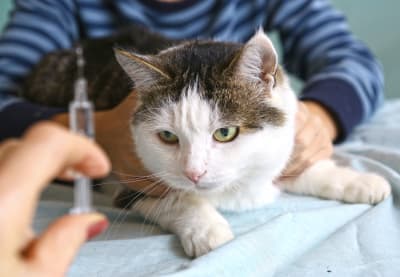What is cat diabetes?
In cats, diabetes mellitus stems from the inability to produce or effectively use insulin - the hormone created by the pancreas that controls the flow of glucose (blood sugar) to the body’s cells. Energy is then sent to the rest of the body.
Without enough insulin, the cells in your cat’s body won’t receive that essential glucose. Instead, a cat’s body feeds on protein cells and fat for energy, while glucose remains unused in the bloodstream. Eventually, it builds up.
Similar to humans, cats can have 2 types of diabetes:
Type I (insulin-dependent)
Not enough insulin is produced or released by the cat’s body to send to the rest of the body.
Type II (non-insulin dependent)
While the body may produce sufficient insulin, tissues or organs resist insulin, and require more insulin than a healthy cat’s body would need to properly produce glucose. Type II diabetes is most common in obese male cats 8 years old or older. Those that consume a diet high in carbohydrates are also at risk. Since their bodies are not able to use the fuel in their food, they may have an insatiable appetite.
Diabetes Signs & Symptoms
Instead of using glucose, a diabetic cat’s body breaks down protein and fat - so even cats with a normal, healthy appetite and who eat on a regular schedule will lose weight. Left untreated, cats with diabetes can experience other health complications or symptoms, including:
- Unhealthy coat and skin
- Dehydration
- Increased thirst
- Bacterial infections
- Liver disease
- Increased urination
- Diarrhea or vomiting
- Lethargy or weakness
Subtle Signs
- Drop in physical activity (uninterested or unable to jump)
- Walking flat on backs of their hind legs (caused by nerve damage)
What are my treatment options if my cat has diabetes?
Though a cure for cat diabetes hasn’t been identified, treatment usually involves officially diagnosing and carefully managing the condition with daily insulin injections. Your vet may train you to give these at home.
You may need to change your furry friend’s diet to ensure they’re getting the proper combination of protein, carbohydrates and fiber. A prescription food formulated especially for diabetic cats may also be beneficial.
What can I do?
Though the disease must be closely monitored by owners and vets, Fluffy can still enjoy quality of life with cat diabetes. Appetite and litter box use should be closely tracked.
Your vet will need to see your cat on a regular basis to monitor their blood sugar and response to treatment. If you’d like, ask if your kitty’s glucose can be tested at home.
It’s critical for senior pets to have a yearly physical exam so any emerging health issues can be identified, diagnosed and treated. This is especially important when it comes to detecting issues early. If you think your cat is exhibiting symptoms of diabetes, schedule an appointment with our Greensboro vets today.
Do you suspect your cat may have diabetes? Our veterinarians can diagnose diseases and conditions and plan treatments. Book an appointment today.
Looking for a vet in Greensboro?
We're always accepting new patients, so contact our veterinary hospital today to book your pet's first appointment.
Related Articles View All
What happens during a routine pet exam?
Routine wellness exams are a proactive way to help safeguard your pet's long-term health and vitality. Why should you take your healthy pet to the vet? What happens during a pet health wellness exam? Find out.
How much does an emergency vet visit cost?
Emergency veterinary care can be costly, but planning ahead allows you to make decisions about your pet's care based on their needs rather than financial restrictions. Today, we look at the cost of emergency vet care, and how to be ready if your pet needs emergency treatment.
Does my cat have asthma?
The treatment for asthma in cats can seem daunting for many pet parents. But your veterinarian can lead you through the diagnosis and treatment process, to help get your cat breathing easier.


